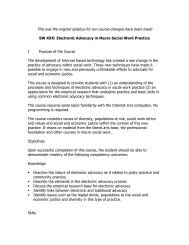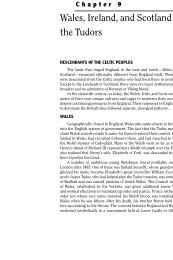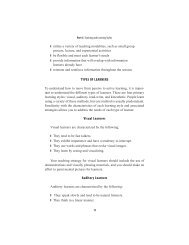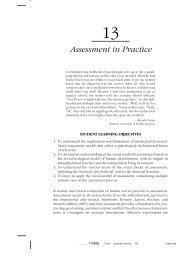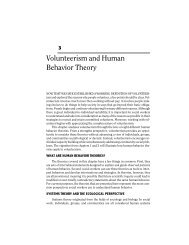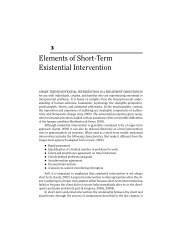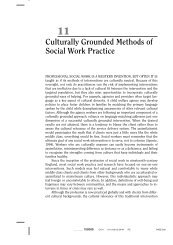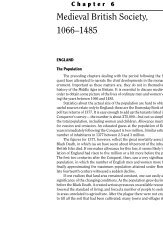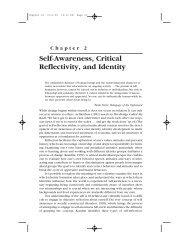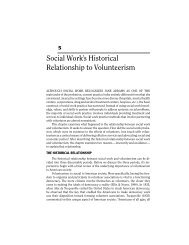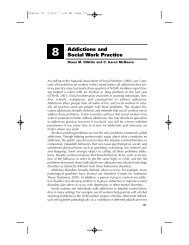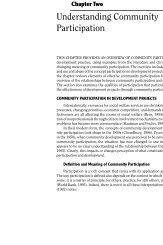Society and Economy in England, 1715–1763 - Lyceum Books
Society and Economy in England, 1715–1763 - Lyceum Books
Society and Economy in England, 1715–1763 - Lyceum Books
Create successful ePaper yourself
Turn your PDF publications into a flip-book with our unique Google optimized e-Paper software.
62 Part I The Age of the L<strong>and</strong>ed Oligarchy<br />
workers were able to control the rhythm of labor themselves—typically slow early<br />
<strong>in</strong> the week <strong>and</strong> rapid toward the end—but they worked very long hours <strong>and</strong> were<br />
subject to abrupt layoffs as the market dem<strong>and</strong>ed. Many habitually were <strong>in</strong>debted<br />
to the master; if so, the domestic worker may have been an artisan but he had<br />
to struggle to ma<strong>in</strong>ta<strong>in</strong> his <strong>in</strong>dependence. Most domestic workers depended as<br />
heavily on the merchant capitalist as the tenant or farm laborer depended on the<br />
l<strong>and</strong>lord.<br />
CUSTOM VERSUS CONTRACT<br />
The commercial sector <strong>and</strong> the commercial spirit were pr<strong>in</strong>cipal factors mak<strong>in</strong>g<br />
the eighteenth century <strong>in</strong> Engl<strong>and</strong> an age of contrasts. They were like fastrunn<strong>in</strong>g<br />
streams relentlessly erod<strong>in</strong>g the massive hills of traditional Engl<strong>and</strong>. In<br />
traditional English society, the hierarchical social structure, the face-to-face relations,<br />
the ideal of paternalism, <strong>and</strong> the power of custom comb<strong>in</strong>ed to make a world<br />
very different from our own. The impersonal, hurried, bureaucratic, <strong>and</strong> competitive<br />
qualities of modern life were much less important then. Everyone except the<br />
very poorest had a place <strong>in</strong> the social system, with privileges <strong>and</strong> duties attached.<br />
Face-to-face relations meant that people lived their lives amid known, if not loved,<br />
faces. Paternalism may have been abused, but its claims were not easily ignored,<br />
<strong>and</strong> it provided that members of the elite felt a personal responsibility for those<br />
with<strong>in</strong> their circle of clients. Custom was stultify<strong>in</strong>g for the ambitious man, as it<br />
was for many women, but it taught rich <strong>and</strong> poor, l<strong>and</strong>lord <strong>and</strong> tenant, farmer <strong>and</strong><br />
laborer, journeyman <strong>and</strong> apprentice what their rights <strong>and</strong> responsibilities were.<br />
Dur<strong>in</strong>g the eighteenth century, however, all these features of an earlier way of<br />
life were slowly be<strong>in</strong>g altered by commercial attitudes: the “cash nexus” or the relations<br />
of “contract” conflicted with custom <strong>in</strong> countless ways <strong>and</strong> <strong>in</strong> a myriad of<br />
localities. The commercialization of English life was not uniform <strong>in</strong> its effects <strong>in</strong><br />
every place or <strong>in</strong> every set of relationships, nor was its work complete by the end of<br />
the century. Nevertheless, the desire for profit <strong>and</strong> for maximiz<strong>in</strong>g the return from<br />
every parcel of property unceas<strong>in</strong>gly worked to shift the basis of relationships from<br />
customary arrangements to contractual barga<strong>in</strong>s. This shift was as true for the agricultural<br />
world as for the commercial. L<strong>and</strong>lords enjoyed luxurious consumption<br />
<strong>and</strong> the requisite mak<strong>in</strong>g of money just as much as the merchant or banker. Everyone<br />
among the propertied elite maneuvered to improve or consolidate his or her<br />
position on the status ladder. Given the power of the l<strong>and</strong>lords <strong>and</strong> rich merchants,<br />
the customary rights of the poor came under constant pressure—a tenancy taken<br />
from the customary family <strong>and</strong> rented to the highest bidder; or rights of forag<strong>in</strong>g<br />
on the wastes denied by new l<strong>and</strong>owners; or customary prices for an artisan’s work<br />
rejected <strong>in</strong> favor of a market price.<br />
The <strong>in</strong>ner social history of eighteenth-century Engl<strong>and</strong> can be written <strong>in</strong> terms<br />
of this sporadic but often desperate struggle. One example, eloquently described by<br />
the historian E. P. Thompson, will have to suffice.* In about 1720, <strong>in</strong> the W<strong>in</strong>dsor<br />
*E. P. Thompson, Whigs <strong>and</strong> Hunters (New York; Pantheon, 1975).



